Search Engines as Affiliates + Publishers
Consumer Finance
Google recently unveiled Google Advisor, which ties together the concept of Google Comparison Ads with a better looking interface.
"With Google Advisor, you enter information about what you’re looking for in a mortgage, credit card, CD, or checking and savings account."
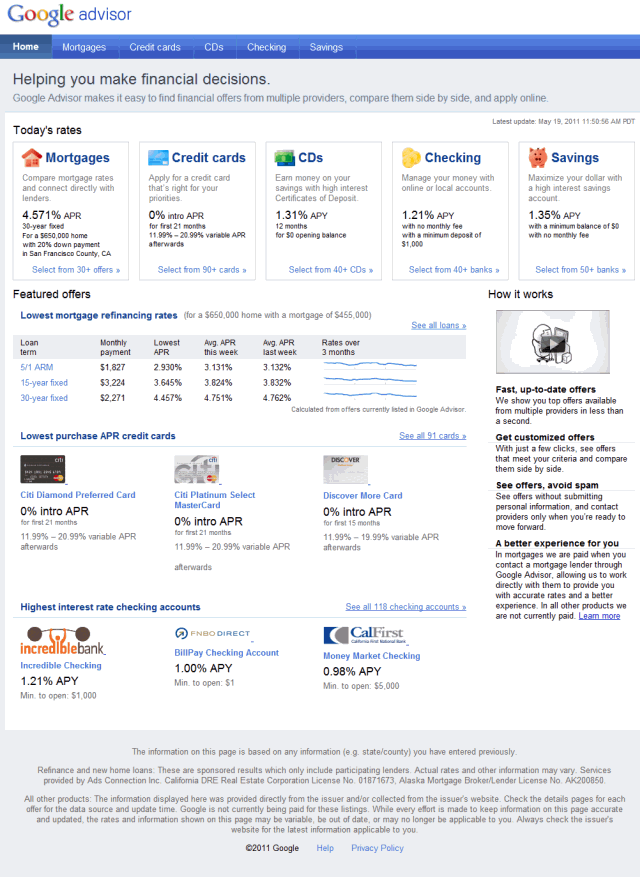
And unlike Google comparison ads, Google is caching these pages
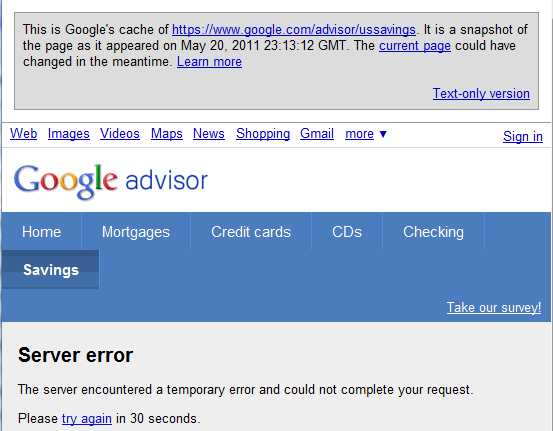
When you add in BeatThatQuote, AdWords, Google affiliate network, Google ads that filter content clicks through to search ads, and AdSense there are at least 6 different ways for Google to sniff data on & monetize the consumer financial product market. And that is if you don't count branded display ads on YouTube as another option.
Fashion
If you go into the fashion market Google has AdWords, Product Ads, AdSense, the Google affiliate network, Boutiques.com & branded Youtube ads. Like.com, which Google purchased in part to build Boutiques.com, also remains a live website & yet another way for Google to taste the fashion market.
Videos / Movies
While Youtube was originally against displaying ads before videos, now that they have huge marketshare they are going to push front-loaded ads harder. Youtube offers a movie store & provides links to MP3s near music.
Books
In books Google has Product ads, AdWords, AdSense, and their ebook marketplace. As soon as Google opened up their ebook store they began ranking their books highly in the "organic" search results
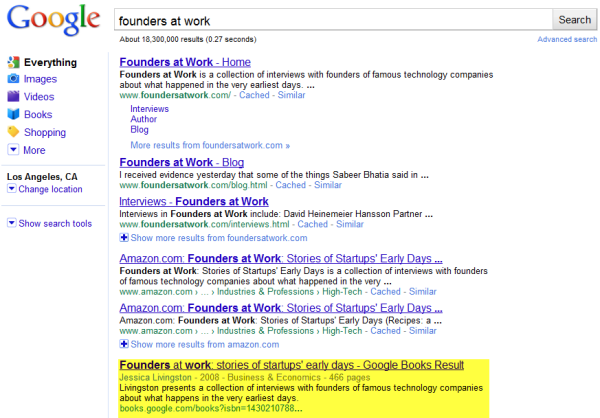
In addition to ranking those ebook pages well in the organic search results, Google also offers a vertical book filter
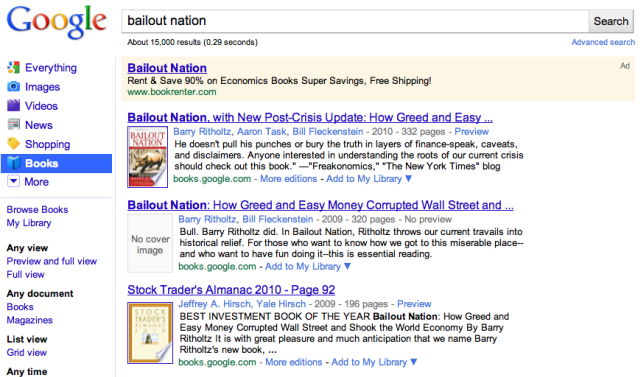
Travel
With flight search Google has ran tests where it looked like they were putting affiliate links directly in the "organic" search results. Their most recent flight search result test has an extended option which puts the organic results below the fold.
Google is monetizing the "organic" results on the hotel front, offering hotel price ads, coupons, and suggesting that at some point they might price ads in a cost per booking affiliate model.
Mobile/Local
In any vertical Google can offer local refinement to get a taste of more of the end user data.

On mobile phones Google can leverage click to call, their local "offers" in addition to using geotargeted AdWords ads. They can even use a person looking up directions as a relevancy signal!
According to Google insiders, mobile operating systems can be used to club "partners" over the head with compatibility requirements. And Google has taken advantage of that opportunity well enough that telecoms are complaining about net neutrality issues amongst the software platforms. As the saying goes, bundling is evil, unless it is Google bundling. ;)
General Commerce Integration
In addition to AdWords, AdSense, Product Ads, product search, merchant reviews & their general web index, Google is trying to pull in information from the offline world. They are set to announce a mobile payment system with the ability to include coupons:
For Google, the system could help boost its digital advertising business. The planned payment system would allow Google to offer retailers more data about their customers and help the retailers target ads and discount offers to mobile-device users near their stores, these people said. Google, which hopes to sell ads and discount offers to the local merchants, isn't expected to get a cut of the transaction fees.
In addition to receiving targeted ads or discount offers, users could manage credit-card accounts and track spending, loyalty points and other things through applications on their smartphones.
Google also invests in technologies that blend ads in content, like VigLink:
tools will allow publishers that opt-in to insert new links automatically into their content, rather them finding the links themselves.
...
Roup said one of the biggest misconceptions that marketers have begins with Google's disapproval of the affiliate marketing model. Google does not have an issue with affiliate marketing, but rather, with marketers trying to buy page rank -- or links that are paid but try to fool the consumer and appear as unpaid, Roup explains. "Our links are financially motivated, so they don't convert page rank, but neither do any other affiliate links," he said.
Google, which claims that you need to disclose any form of paid links in human & machine readable formats now invests in automated paid links, with blurred & inconsistent levels of disclosure. See for yourself.
Other Vertical Projects
Google can make minor design tweaks to their productivity suite and then launch it under any label they like, from project management to wedding planning.
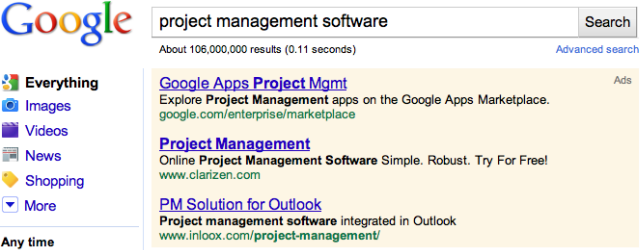

Monetizing Dirty Markets
Google set aside a half-billion Dollars to settle an issue with the US Department of Justice over selling bogus online prescription drug ads. Google was repeatedly warned over the practice, but rode it until they got caught in a sting operation. Likewise, their general "AdWords advertisers selling counterfeit products" was over 50,000 strong by the time Google finally shut them down. And the whole time Google was recommending searchers search for things like "warez" & "serials," a practice which they finally stopped based on regulatory pressure.
In dirty ad markets where illegal goods & services are pushed Google can (and does) monetize them at the general ad network level until they cause public relations issues, allowing Google to capture a large portion of the reward with minimal risk.

Google can get to know you a bit better & monetize literally anything.


While Google claims ad disclosure is important, they can "accidentally" leave it off when convenient. I just recently saw the following ad served by Google's DoubleClick. I have no idea what it was promoting though, as I was afraid to click on it.

It's Not Just Google
Obviously I mentioned Google because they are the most successful search company. However, Google is not the only search company monetizing their organic search results & pushing results below the fold.
Ask monetizes their "organic" results via a variety of cross-promotional results.

Yahoo! has custom "organic" ad units & intends to further monetize search with their Search Direct offering.
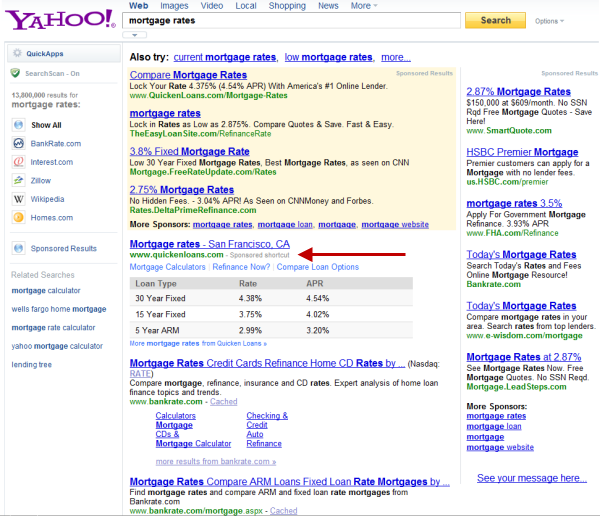
Bing, which has remained fairly clean, also offers promotional vertical results in their organic search results.
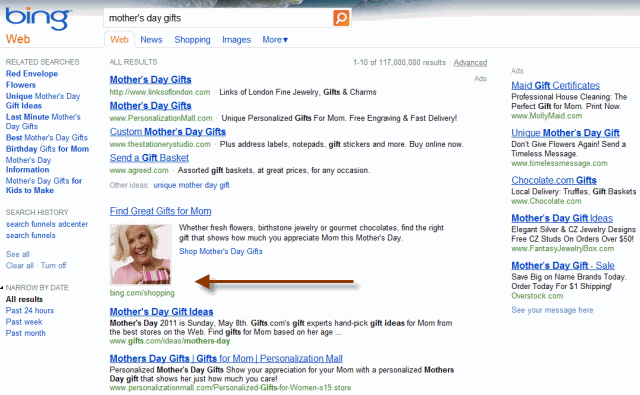
As search engines take big slices out of their search ecosystems, the gap between winners & losers will only grow.




Comments
Man this is total BS. I can't believe what they are doing.
Also do you note how all of the search engines are becoming more crafty with placing an ad or placement directly above the genuine no.1 organic listing? I think most people have trained themselves to ignore ads on the right and at the top as this is how all search engines work, however with search engines blending effectively a paid listing (albeit their own) along with the genuine listings is just entirely out of order.
All we can hope, is that surfers become more intelligent and will start to ignore these, people do tend to hate adverts, so hopefully they can learn this behaviour.
Have we got any stats on recent click through behaviour? I know AOL and others done some studies years ago showing 40% CTR on no.1 organic, but what about now where the SERPS are just massively crowded.
This is going to have a massive knock on impact on everyones potential earnings, of those who are affected.
I think this is really out of order.
I love how Google spent a couple of years telling us all about how affiliate networks were low quality and harmed search, and then they turned around and launched Boutiques.com and became an affiliate themselves. There was a time when I believe there quality argument - now, I have to wonder if they just pushed out affiliates so they could take over the space themselves.
add to this, the fact that they can see your site (or AdWords account) as "bad" for whatever undisclosed reason, and cut you out. The competitor as the conduit to a marketplace they dictate, control, and eagerly join. Is it evil yet?
To me it seems like the pot calling the kettle black. I love how they have told us how you have to stick to a strict set of guidlines, yet they can blend ads with organic listings and spam us. What a bunch of B.S.
It would be shocking if it wasn't so common with this company. They spend the last few years purging affiliates from their Adwords system. They lowered the quality score boom on many of the comparision sites. Not to "clean up their results", but to eliminate any and all competition.
I'd love to see the DOJ or others press them on this, but lets face it, they buddied up with politicians over the years for a reason. It was only a matter of time before the level playing field of the internet shifted to the unbalanced one we see offline.
the search engines implement these things so close together that it has the appearance of collusion. I certainly hope that the DOJ is watching as the search engines are using a public property, the internet and are employing questionable tactics at best.
Add new comment